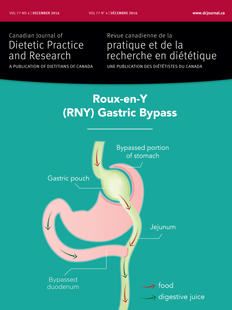Abstract
Purpose: The objective of this study was to investigate factors affecting the intention of Registered Dietitians (RDs) to discuss nutrigenetics with their patients/clients.
Methods: A survey based on the theory of planned behaviour (TPB; attitude, subjective norm, and perceived behavioural control) was developed and sent by email to RD members of the Ordre professionnel des diététistes du Québec. Multiple regression analyses were performed to examine the determinants of intention and behaviour.
Results: A total of 141 RDs completed the questionnaire (5.8% response rate). On a scale from −2 to 2 (from strongly disagree to strongly agree), the intention of discussing nutrigenetics with patients/clients was neutral (mean of −0.07 ± 0.92). The TPB construct of attitude was the most strongly associated with intention (β = 0.66, P < 0.0001) followed by perceived behavioural control (β = 0.33, P < 0.0001) and subjective norm (β = 0.21, P = 0.03). Finally, 13 out of 141 RDs (~9%) actually practiced the behaviour, which was to have discussed nutrigenetics with their patients/clients in the last 3 months. Only perceived behavioural control contributed to explain the behaviour (β = 0.17, P < 0.0001).
Conclusions: Main determinants of the intention of RDs to discuss nutrigenetics with their patients/clients were determined. This knowledge will help inform the design of future educational content about nutrigenetics.
Résumé
Objectif. L’objectif de cette étude était d’examiner les facteurs ayant un impact sur l’intention des diététistes de discuter de nutrigénétique avec leurs patients ou clients.
Méthodes. Un sondage basé sur la théorie du comportement planifié (TCP; attitude, norme subjective et perception du contrôle comportemental) a été mis au point et envoyé par courriel aux diététistes membres de l’Ordre professionnel des diététistes du Québec. Des analyses de régression multiple ont été réalisées afin d’examiner les déterminants de l’intention et du comportement.
Résultats. Au total, 141 diététistes ont rempli le questionnaire (taux de réponse de 5,8 %). Selon une échelle allant de −2 à 2 (de fortement en désaccord à fortement en accord), l’intention de discuter de nutrigénétique avec les patients ou clients se situait au niveau neutre (moyenne de −0,07 ± 0,92). Le construit d’attitude de la TCP était le plus fortement associé à l’intention (β = 0,66, P < 0,0001) suivi de la perception du contrôle comportemental (β = 0,33, P < 0,0001) et de la norme subjective (β = 0,21, P = 0,03). Finalement, 13 des 141 diététistes (~9 %) avaient adopté le comportement, c’est-à-dire qu’elles avaient discuté de nutrigénétique avec leurs patients ou clients au cours des 3 mois précédents. Seule la perception du contrôle comportemental a contribué à expliquer le comportement (β = 0,17, P < 0,0001).
Conclusions. Les principaux déterminants de l’intention des diététistes de discuter de nutrigénétique avec leurs patients ou clients ont été déterminés. Cette connaissance contribuera à orienter la conception de futur contenu éducatif sur la nutrigénétique.



